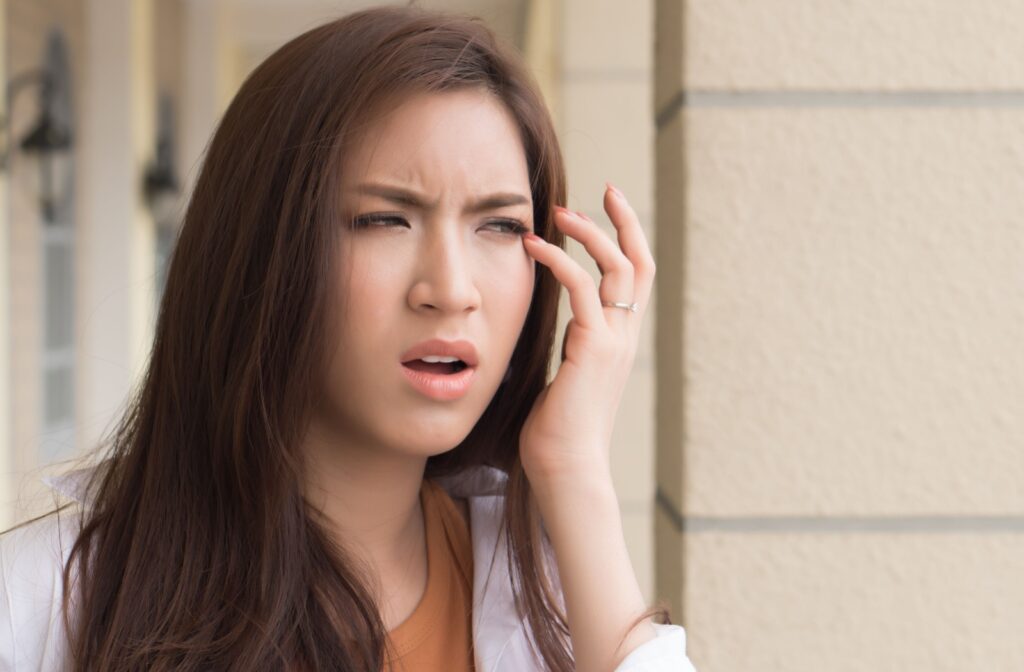Dry, itchy, gritty eyes—if you’ve dealt with the symptoms of dry eye, you know just how frustrating and uncomfortable it can be. While the day-to-day annoyance is enough to cause most to seek relief, many wonder whether dry eyes can cause blindness.
Mild or moderate dry eye won’t cause permanent damage to your vision. However, severe dry eye can damage the cornea or front layer of the eye, which can cause impaired vision. Your eye doctor can help you manage your symptoms for relief and vision comfort.
What Is Dry Eye?
Dry eye occurs when your eyes don’t produce enough tears or they produce poor-quality tears. Tears are essential for keeping your eyes hydrated, lubricated, and protected. Without them, your eyes can feel irritated, and your vision may suffer.
Some people are more susceptible to dry eyes based on their lifestyle, health, or environmental factors. Common causes of dry eyes include:
- Spending prolonged hours staring at screens or doing tasks requiring intense focus
- Environmental factors like dry, windy weather
- Age, especially being over 50
- Long-term contact lens wear
- Certain medical conditions
- Some medications, like antihistamines, antidepressants, or certain birth control pills
Dry eye symptoms to look out for include:
- A gritty or sandy feeling in your eyes
- Frequent stinging or burning sensations
- Excessive watering
- Sensitivity to light
- Blurred or fluctuating vision
- Eyes that are constantly red
- Difficulty wearing contact lenses
Can Dry Eyes Cause Blindness?
While it’s rare that dry eyes cause blindness, you shouldn’t ignore the symptoms. Severe or prolonged dry eyes can damage the cornea—the clear outer layer of your eye—leading to complications like corneal scratches, scarring, or infections. Corneal damage or cloudy vision from these complications, if untreated, can impair vision.
Chronic dry eyes can last for weeks or months. To avoid this, prompt treatment and consistent management are key. Regular eye exams can help address underlying issues early before they impact your vision long-term.
Diagnosing Dry Eye

Your doctor will typically screen for dry eyes as part of a comprehensive dilated eye exam. Several tests to diagnose dry eye include:
- Measuring the amount of tears your eyes produce.
- Assessing tear evaporation rate.
- Examining the structure and function of your eyelids.
- Checking for corneal damage caused by dry eye.
Preventive Measures to Protect Your Eye Health
Taking care of your eyes doesn’t have to be complicated. A few simple changes can go a long way in reducing your risk of dry eyes. Here’s how you can start protecting and soothing your eyes:
- Take breaks from screens: Follow the 20-20-20 rule—every 20 minutes, look at something 20 feet away for 20 seconds.
- Use a humidifier: Adding moisture to the air can prevent your eyes from drying out in low-humidity environments.
- Wear sunglasses: Protect your eyes from wind and UV rays when outdoors.
- Blink often: Especially when looking at screens, remembering to blink fully can naturally hydrate your eyes with tears.
- Stay hydrated: Drink plenty of water to promote healthy tear production.
How to Treat Dry Eye
If you’re already experiencing the symptoms of dry eyes, it’s important to know that relief is possible. Our eye doctors are dry eye specialists who offer more than just standard eye drops to manage dry eyes. We provide a tailored approach, including targeted treatments designed to target the root cause of your condition.
Intense pulsed light (IPL)
IPL therapy uses pulsing light to warm the eye area. This helps reduce inflammation and improves the functionality of the meibomian glands, which release the oil component in tears. Based on your dry eye severity, you may need multiple IPL sessions.
Radiofrequency (RF)
RF therapy emits radio waves to target the meibomian glands and boost oil production in your tear film, improving hydration and comfort.
BlephEx
BlephEx is a handheld device that removes debris, bacteria, and biofilm by gently cleaning and exfoliating the eyelids. This eyelid hygiene treatment only takes a few minutes to perform.
LipiFlow
LipiFlow uses a device that gently massages and sends warmth to the eye glands. This helps with oil flow and helps promote healthier tears.
Prescription Medications or Eye Drops
Your eye doctor may recommend medicated eye drops or prescription treatments in chronic cases. Our eye doctors will work with you to create a step-by-step plan to address your unique needs.
Eye Health Matters
Your eyes work hard for you every day. You can achieve clearer vision, less discomfort, and better overall eye health by caring for your eyes. While dry eyes may not directly lead to blindness, neglecting them can result in avoidable complications.
If you’re tired of struggling with dry eyes or feeling like eye drops aren’t enough, we’re here to help. Book an appointment with Precision Eye Care to discover how we can tailor dry eye treatment with innovative solutions to provide lasting relief and protect your vision for years to come.





